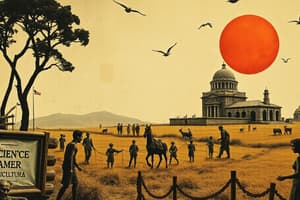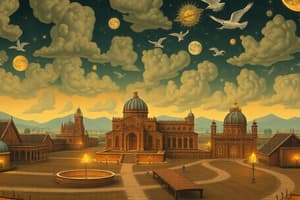Podcast
Questions and Answers
Какое событие по мнению авторов текста ознаменовало собой поворотный момент в человеческой истории?
Какое событие по мнению авторов текста ознаменовало собой поворотный момент в человеческой истории?
Переход от кочевого образа жизни охотников и собирателей к оседлому земледелию
Какие факторы позволили развиваться ранним цивилизациям?
Какие факторы позволили развиваться ранним цивилизациям?
Развитие земледелия, создание сложных систем орошения
Какие ранние цивилизации упоминаются в тексте?
Какие ранние цивилизации упоминаются в тексте?
- Рим
- Древний Египет (correct)
- Греция
- Долина Инда (correct)
- Месопотамия (correct)
- Китай (correct)
Чем характеризовалась Древняя Греция?
Чем характеризовалась Древняя Греция?
Какие достижения были характерны для Древнего Рима?
Какие достижения были характерны для Древнего Рима?
Древняя Римская Республика всегда оставалась республикой.
Древняя Римская Республика всегда оставалась республикой.
Что характерно для средневекового периода?
Что характерно для средневекового периода?
Какие важные события произошли в средневековье?
Какие важные события произошли в средневековье?
Что положило начало Ренессансу?
Что положило начало Ренессансу?
Какие ключевые фигуры связаны с Ренессансом?
Какие ключевые фигуры связаны с Ренессансом?
В чем заключалась суть Реформации?
В чем заключалась суть Реформации?
Кто был ключевыми фигурами Реформации?
Кто был ключевыми фигурами Реформации?
Что характеризовало эпоху Просвещения?
Что характеризовало эпоху Просвещения?
Кто были видными мыслителями Просвещения?
Кто были видными мыслителями Просвещения?
В чем суть Промышленной революции?
В чем суть Промышленной революции?
Где и когда началась Промышленная революция?
Где и когда началась Промышленная революция?
Какие изменения в обществе произошли вследствие Промышленной революции?
Какие изменения в обществе произошли вследствие Промышленной революции?
Что характеризовало XIX век?
Что характеризовало XIX век?
Какие важнейшие события произошли в XX веке?
Какие важнейшие события произошли в XX веке?
Какие новые технологии появились в XX веке?
Какие новые технологии появились в XX веке?
Какие социальные движения появились в XX веке?
Какие социальные движения появились в XX веке?
Каковы особенности современного периода?
Каковы особенности современного периода?
Какие проблемы сохраняют свою актуальность в ХХI веке?
Какие проблемы сохраняют свою актуальность в ХХI веке?
Что, по мнению авторов текста, должно стать приоритетом в будущем?
Что, по мнению авторов текста, должно стать приоритетом в будущем?
Flashcards
Переход к оседлому образу жизни
Переход к оседлому образу жизни
Переход от кочевого образа жизни охотников-собирателей к оседлому сельскохозяйственному обществу. Важный момент в истории человечества.
Развитие сельского хозяйства
Развитие сельского хозяйства
Развитие сельского хозяйства позволило производить больше продуктов, поддерживая большие популяции и специализацию труда.
Древние цивилизации
Древние цивилизации
Месопотамия, Египет, Индусская долина и Китай – примеры древних цивилизаций, которые развили уникальные социальные структуры, политические системы и культурные практики.
Система орошения
Система орошения
Signup and view all the flashcards
Полисы (Греция)
Полисы (Греция)
Signup and view all the flashcards
Древний Рим
Древний Рим
Signup and view all the flashcards
Феодализм
Феодализм
Signup and view all the flashcards
Средние века
Средние века
Signup and view all the flashcards
Возрождение
Возрождение
Signup and view all the flashcards
Реформация
Реформация
Signup and view all the flashcards
Просвещение
Просвещение
Signup and view all the flashcards
Agricultural Revolution
Agricultural Revolution
Signup and view all the flashcards
Mesopotamia
Mesopotamia
Signup and view all the flashcards
City-states (poleis)
City-states (poleis)
Signup and view all the flashcards
Roman Empire
Roman Empire
Signup and view all the flashcards
Feudalism
Feudalism
Signup and view all the flashcards
Renaissance
Renaissance
Signup and view all the flashcards
Reformation
Reformation
Signup and view all the flashcards
Enlightenment
Enlightenment
Signup and view all the flashcards
Industrial Revolution
Industrial Revolution
Signup and view all the flashcards
Globalization
Globalization
Signup and view all the flashcards
Study Notes
Early Civilizations
- Early human societies transitioned from nomadic hunter-gatherer lifestyles to settled agricultural communities, marking a pivotal shift in human history.
- The development of agriculture allowed for the surplus production of food, supporting larger populations and the emergence of specialized labor.
- Examples of early civilizations include those in Mesopotamia, Egypt, the Indus Valley, and China, each developing unique social structures, political systems, and cultural practices.
- These civilizations often relied on advanced irrigation systems, creating fertile agricultural lands, enabling significant population growth.
Ancient Civilizations
- Ancient Greece, characterized by its city-states (poleis), fostered democratic ideals and philosophical inquiry, leaving a profound influence on Western thought.
- Ancient Rome, a powerful empire, developed advanced legal systems, infrastructure, and military organization, influencing law and governance in many subsequent societies.
- The Roman Republic transitioned to an empire, experiencing periods of expansion and internal conflict.
- Important developments included the spread of Roman law, language (Latin), and engineering techniques across their vast territories.
Medieval Period (Middle Ages)
- The fall of the Roman Empire ushered in the Medieval period, characterized by feudalism and the rise of powerful religious institutions.
- Feudalism created a complex hierarchical social system with obligations between lords, vassals, and serfs.
- The Roman Catholic Church played a significant role in European society, influencing culture, education, and political structures.
- Important developments in this period include the Crusades, the Black Death, and the rise of universities.
Renaissance and Reformation
- The Renaissance (roughly 14th-17th centuries) witnessed a renewed interest in classical learning and art from antiquity, leading to significant advancements in various fields.
- The Reformation, a religious movement initiated by Martin Luther, challenged the authority of the Roman Catholic Church, leading to religious fragmentation in Europe and impacting political landscapes.
- Key figures like Leonardo da Vinci, Michelangelo, and William Shakespeare shaped the Renaissance, while reformers like John Calvin and Henry VIII impacted the Reformation.
The Enlightenment and Industrial Revolution
- The Enlightenment, an intellectual movement emphasizing reason and individual rights, challenged traditional authorities and spurred revolutionary movements.
- Key Enlightenment thinkers like John Locke, Jean-Jacques Rousseau, and Immanuel Kant contributed to revolutionary ideas about governance and individual liberties.
- The Industrial Revolution began in Great Britain in the late 18th century, marked by technological innovation and the shift from hand production techniques to machine production.
- This revolution significantly altered social structures and economies, leading to urbanization, new social classes, and greater global interconnectedness.
19th and 20th Centuries
- The 19th century was dominated by nationalism, imperialism, and industrial growth.
- The 20th century witnessed the World Wars, the Cold War, and significant social and political changes across the globe.
- The development of new technologies led to communication revolution and the emergence of powerful global organizations like the United Nations.
- This era saw widespread social movements, including women's suffrage, civil rights, and environmentalism.
- The world experienced unprecedented global interconnectedness alongside heightened global conflict and political tension.
Contemporary Period
- The 21st century witnesses globalization, technological advancements, and complex international relations.
- Developments include global interconnectedness further accelerated by technological breakthroughs in communication and transportation.
- Challenges to global peace persist, along with complex humanitarian crises.
- International cooperation and sustainable development remain areas of focus for the future.
- The rise of diverse and often conflicting ideologies continue to shape political identities and international relations.
Studying That Suits You
Use AI to generate personalized quizzes and flashcards to suit your learning preferences.




